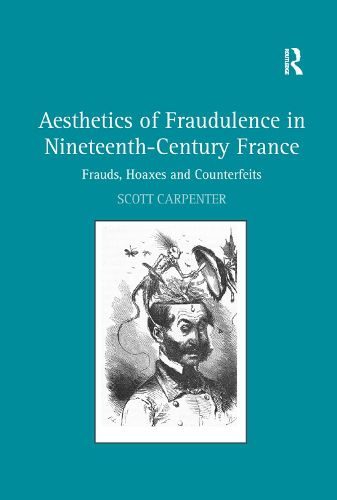Readings Newsletter
Become a Readings Member to make your shopping experience even easier.
Sign in or sign up for free!
You’re not far away from qualifying for FREE standard shipping within Australia
You’ve qualified for FREE standard shipping within Australia
The cart is loading…






In his engagingly written and original book, Scott Carpenter analyzes multiple manifestations of the false in nineteenth-century France. Under Carpenter’s thorough and systematic analysis, fraudulence emerges as a cultural preoccupation in nineteenth-century literature and society, whether it be in the form of literary mystifications, the thematic portrayal of frauds, or the privileging of falseness as an aesthetic principle. Focusing particularly on the aesthetics of fraudulence in works by Merimee, Balzac, Baudelaire, Vidocq, Sand, and others, Carpenter places these literary representations within the context of other cultural phenomena, such as caricature, political history, and ceremonial events. As he highlights the special relationship between literary fiction and fraudulence, Carpenter argues that falseness arises as an aesthetic preoccupation in post-revolutionary France, where it introduces a blurring of limits between hitherto discrete categories. This transgression of boundaries challenges notions of authenticity and sincerity, categories that Romantic aesthetics championed at the beginning of the nineteenth century in France. Carpenter’s study makes an important contribution to the cultural significance of mystification in nineteenth-century France and furthers our understanding of French literature and cultural history.
$9.00 standard shipping within Australia
FREE standard shipping within Australia for orders over $100.00
Express & International shipping calculated at checkout
Stock availability can be subject to change without notice. We recommend calling the shop or contacting our online team to check availability of low stock items. Please see our Shopping Online page for more details.
In his engagingly written and original book, Scott Carpenter analyzes multiple manifestations of the false in nineteenth-century France. Under Carpenter’s thorough and systematic analysis, fraudulence emerges as a cultural preoccupation in nineteenth-century literature and society, whether it be in the form of literary mystifications, the thematic portrayal of frauds, or the privileging of falseness as an aesthetic principle. Focusing particularly on the aesthetics of fraudulence in works by Merimee, Balzac, Baudelaire, Vidocq, Sand, and others, Carpenter places these literary representations within the context of other cultural phenomena, such as caricature, political history, and ceremonial events. As he highlights the special relationship between literary fiction and fraudulence, Carpenter argues that falseness arises as an aesthetic preoccupation in post-revolutionary France, where it introduces a blurring of limits between hitherto discrete categories. This transgression of boundaries challenges notions of authenticity and sincerity, categories that Romantic aesthetics championed at the beginning of the nineteenth century in France. Carpenter’s study makes an important contribution to the cultural significance of mystification in nineteenth-century France and furthers our understanding of French literature and cultural history.